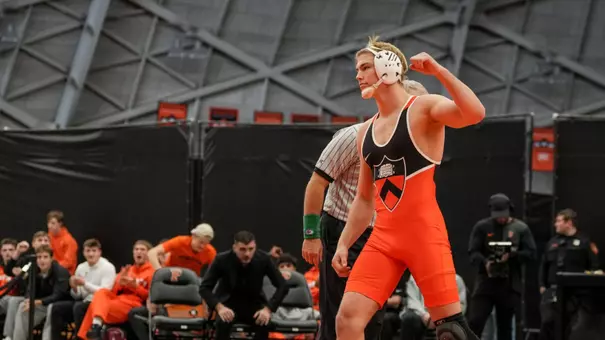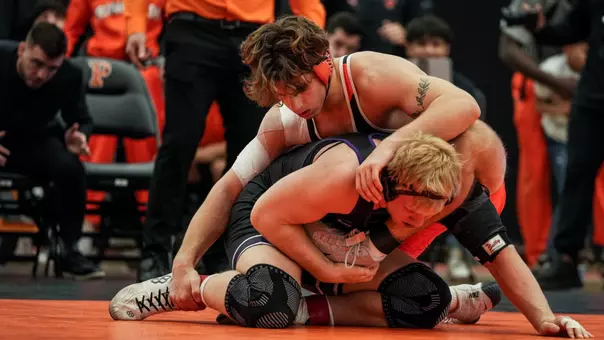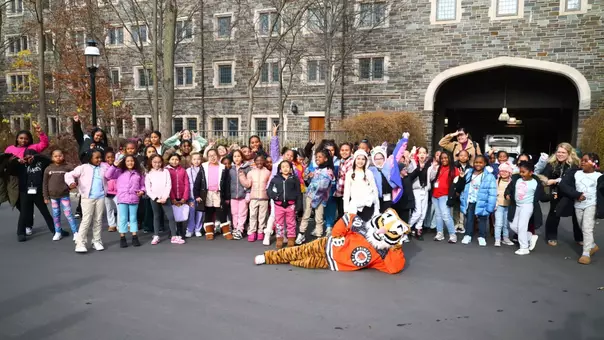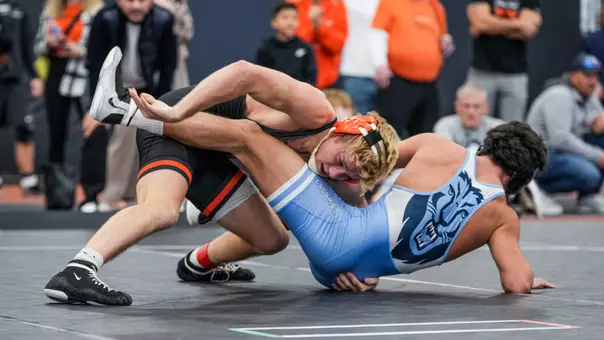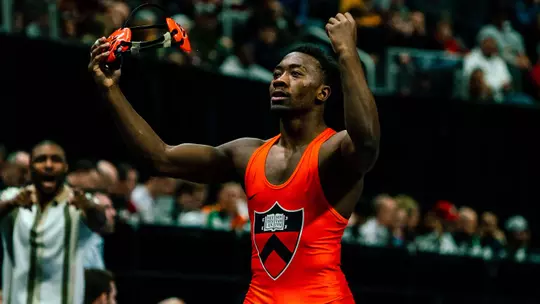
A Big-Stage Homecoming for Quincy Monday
3/14/2023
When Quincy Monday wrestles collegiately for his New Jersey-based school, he is announced with the hometown of Chapel Hill, N.C., part of the Triangle region of the state and about an eight-hour drive from Princeton. With the NCAA Championships being held in Tulsa, Okla., this year, there appears at first to be no connection. It might as well be held in Seattle or Phoenix or Detroit, as they were last year.
But a closer look at Monday and his family means that the location of this year's NCAAs might as well be in Quincy Monday's backyard.
Quincy Monday was born Tulsa in the last few months of the last millennium, and both of his parents, Kenny and Sabrina, are from Tulsa as well, with the lineage going back in the community even further. Kenny Monday is a 1980 graduate of the city's Booker T. Washington High School, just a few miles northeast of the BOK Center in downtown Tulsa, where the NCAA Championships will be held.
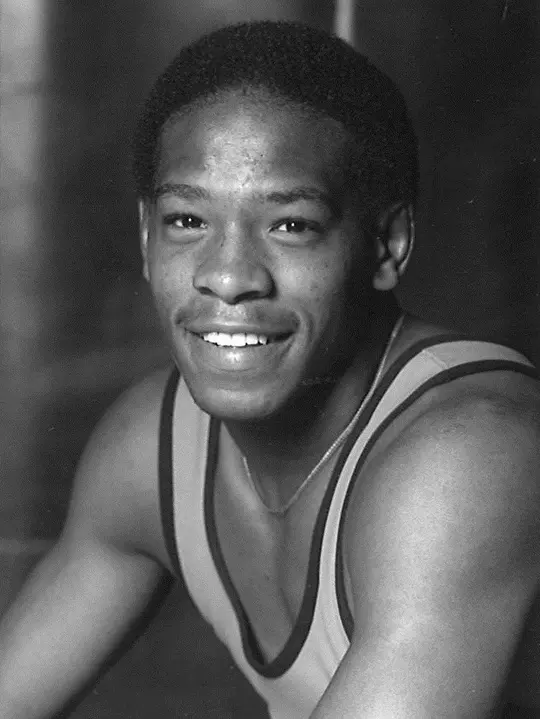
If you drew a straight line on the map between the BOK Center and Booker T. Washington High School, it would pass right through the Greenwood District, a triangle-shaped section adjacent to downtown and a mere seven blocks from the arena where Quincy Monday hopes to end his career with an NCAA Championship on March 18.
Today, the largest chunk of the Greenwood district, halved into that triangle shape by Interstate 244, part of a freeway loop that encircles downtown Tulsa, is ONEOK Field, a minor-league baseball and soccer park opened in 2010. While the ballpark stands out for its size, other sites around the neighborhood tell a story that, particularly to those outside the Tulsa area, was not well known until the societal events of 2020 and its then-upcoming 100th anniversary in 2021.
As the recounting from the Tulsa Historical Society tells it, On May 31, 1921, a Black man named Dick Rowland was arrested following a disputed incident in an elevator he shared with a white woman, Sarah Page. As word spread and rumor took hold in Tulsa's white community, tensions grew and soon erupted into the utter devastation of the Greenwood district, a center of the Black community in Tulsa and known as Black Wall Street, as businesses and homes were destroyed. As many as 300 people may have died, according to the Historical Society.
“The historical tragedy that took place in 1921 was not just between two racially different individuals, Dick Rowland and Sarah Page, the Massacre was set to destroy the Greenwood District Community,” Miles Smith, Jr., Princeton Athletics' Associate Director of Athletics for Diversity, Equity and Inclusion, who has studied the events in Greenwood in 1921, said. "This community was economically thriving for all black residents. The Greenwood District offered all resources for success: schools, churches, banks, grocery stores, restaurants, movie theaters, hotels, barbershops, law firms, etc., all establishments were black owned. I consider the Greenwood District to be the foundation of Black Fashion, Black Entertainment, and Black Unity. O.W. Gurley [a founder of the Greenwood District] strategically gave social and economic freedom to a community during a time when freedom was extremely limited for black people.
“In the article ‘Black Excellence Personified: Remembering Black Wall Street,’ Patrice M. Palmer writes, ‘The success of Greenwood was an intentional act of solidarity by Black people looking to escape oppression and create the American Dream for themselves and future generations.’ Quincy serves as a member of the future generation. Quincy has co-founded an affinity group [Princeton's Black Student-Athlete Collective] that is providing solidarity amongst the black student-athletes at Princeton. This is an amazing example of black joy.”
In the intervening decades, according to a history of Greenwood written in the Philadelphia Tribune, a series of governmental policies and factors hurt Greenwood's ability to sustain a recovery it built in the 1930s and 1940s. The 244 freeway, built in the 1960s, sliced right through the neighborhood, putting present-day Greenwood on the opposite side of what is now the Tulsa campus of Oklahoma State University, but where an earlier location of Kenny Monday's high school alma mater, Booker T. Washington, served as the area's high school.
Memorials and commemoration sites to recognize the neighborhood and tell the story of what happened in 1921 now dot the area. In one corner is John Hope Franklin Reconciliation Park, named for Tulsan Dr. John Hope Franklin, also a Booker T. Washington alum whose connection to the Ivy League includes a master's and a doctorate in history from Harvard, the latter earned in 1941. The park's two centerpieces are a series of bronze sculptures depicting images from the 1921 riot and a 26-foot tower evoking images of Black and Native American history in the area. In another corner of the district is Greenwood Rising, a history center opened in 2021. On the other side of the 244 freeway is the Greenwood Cultural Center, which tells the story of the African-American community in the city.
“It definitely means a lot to us to be able to tell the story of the race riots and the race massacre that happened and the thriving Black community that was existing in Tulsa at the time,” Quincy said. “I think that’s a history that a lot of people aren’t aware about, and so I think with the national championships being there this year, it’s a great opportunity for people to learn about that history that often doesn’t get publicized as much.”
It can't be ignored that the 100th anniversary of the attack on Greenwood came a year after the death of George Floyd in Minneapolis and the increased attention that Floyd's death, and the way it happened, brought to the plight of the Black community in the U.S.
“I definitely wish the circumstances could have been better for people to hear about the history and the stories, but I think any chance that we can get to tell these stories and these histories is an important one,” Quincy said.
Quincy's commitment to bringing the Black community together on campus led him to co-found the Princeton Black Student-Athlete Collective, creating opportunities for student-athletes to build community at their home away from home.
Even though Quincy's immediate family moved to the Dallas area when he was a young child, following Kenny Monday's coaching career, that line drawn on the map between the BOK Center, Greenwood and Booker T. Washington High School has a strong connection to Monday's family to this day. His aunt, Regina Goodwin, represents the whole run of that line in the Oklahoma House, where she has served since 2015.
“It’s where my parents are from and it’s where they were born and raised,” Quincy said. “I think it’ll really feel like home having a lot of my family there. My family is already drawing up t-shirt designs like ‘Tulsa Born,’ all that stuff. It’s really exciting and I think we’re just going to have a lot of fun with it.”
Kenny Monday was born in Tulsa in 1961 and began a wrestling career that saw him become Oklahoma's first high school wrestler to win four state titles before graduating in 1980 and heading about an hour west for college at Oklahoma State in Stillwater, Okla. By the time Kenny arrived in Stillwater, the program had already won 27 NCAA team titles, first as Oklahoma A&M before taking the Oklahoma State name in 1957. The success continued for Kenny at OSU, making the NCAA finals three times in earning three All-American honors and winning the 150-pound NCAA title in his senior year in 1984.
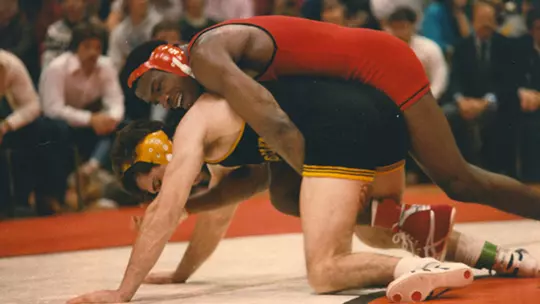
Oklahoma State was far from the last venue that saw Kenny achieve success on the mat. He went on to be a three-time Olympian, winning gold at 74 kg (163 lb) in 1988 in Seoul, following that with a silver medal again at the weight in 1992 in Barcelona, and making his final Olympic appearance in 1996 in Atlanta, placing sixth, again at 74 kg. Kenny was inducted into the National Wrestling Hall of Fame in 2001, and in 2022, he was named head coach at Morgan State, an HBCU in Maryland, as the school brings back wrestling for the first time in 25 years.
Both of Kenny's sons, Quincy and older brother Kennedy, have followed their father into wrestling, with Kennedy wrestling at North Carolina and making the NCAA Championships in his final season as a Tar Heel in 2021. Kennedy and Quincy are two of Kenny and Sabrina's three children, behind older sister Sydnee.
As Princeton wrestling fans know, Quincy has already put together one of the great careers in program history, regardless of what happens in March. Even before the 2023 field is set, Quincy is a three-time NCAA qualifier, with one of those trips lost to the pandemic as the 2020 NCAA field was announced but the event was canceled. Quincy earned his first All-American honor that year, determined by the NWCA instead of the usual path of finishing top-eight at the NCAA Championships.
With Princeton and the Ivy League withdrawing from competition in 2020-21 due to the ongoing pandemic, Quincy lost the chance to compete in the 2021 NCAAs in St. Louis, but what the pandemic took away that season, it has given back this year. As afforded to all Princeton students in 2020-21, Monday took the opportunity to withdraw from the university for the year and return as a junior in 2021-22, which would otherwise have been his last season with the program.
“It’s kind of a bright side of losing that year that I get to compete where my family is from, in Tulsa, Okla., and it just feels like a very storybook ending to my college career,” Quincy said. “Looking back on my career thus far, it’s been a great journey, a great ride. I love the experiences I’ve gained here, and this is just another opportunity to really close out this chapter in a way that really means a lot to me and my family and building on a legacy I’ve built here and then also the legacy that my family has had coming out of Tulsa.”
Quincy came within a match of winning all he possibly could on the mat in 2022, becoming an EIWA champion for the first time and winning his way to the NCAA finals. Had it not been for teammate Patrick Glory doing the same at the 2022 NCAAs, Quincy would have been Princeton's first NCAA finalist in 20 years. Instead, he and Glory gave Princeton its first two-finalist NCAAs ever.
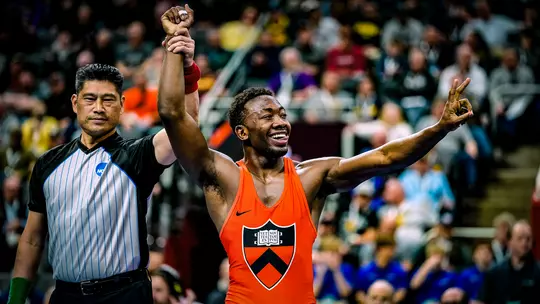
If Quincy does nothing else in a Princeton singlet, he will already have accomplished becoming one of just 43 men in program history to win an EIWA title and one of just nine men to be a two-time All-American. He is also already the first Black Princetonian to earn All-American honors in wrestling, becoming a trailblazer in the path of his father, who was the first Black American to win gold in freestyle wrestling.
If he does the same thing in 2023 that he did in 2022, he will enter an even smaller group of Princeton wrestlers, regardless of background or familial lineage. He would be the 15th Tiger to be a multi-time EIWA champion, and if he can earn a third All-American honor, he would be only the third Princeton wrestler to do that, alongside current and former teammates Matthew Kolodzik and Glory. And if he's able to do that in 2023, it would follow a mid-season weight class change that saw him leave the 157-pound class, where he was regarded as the top wrestler in the country at that weight during the season, and become a 165-pounder, where his competitive debut at the weight came as he won the Midlands title. He carries a No. 4 national ranking by the NCAA Coaches panel at 165 in the Feb. 23 poll.
He may be the first Black Princetonian to earn All-American honors in wrestling, but he aims for his influence to make him just the first, not the only, at least not for long.
“I think it definitely breaks down barriers and makes it easier for someone to come in and have a vision and a goal if they seen someone else be able to achieve that,” Quincy said. “Being the first Black All-American for Princeton Wrestling, it means a lot to me and I just hope that we can grow on that and extend it so we’re to the point we have multiple ones and I won’t always be the only one.”
For the culture, 5 NCAA champs
— David Carr (@Carrchamp) March 21, 2021
5 African Americans #history ???????? pic.twitter.com/uGqcszXw96
Something that Quincy Monday did miss out on by not being able to make a run at the 2021 NCAAs was to end up in a photo posted to Twitter by David Carr as one of five Black wrestlers to win an NCAA title that year, a group that made up half the winners. It's a group that includes Minnesota's Gable Steveson, Iowa State's Carr, and the Penn State trio of Aaron Brooks, Roman Bravo-Young and Carter Starocci.
The same group nearly repeated in 2022, with Steveson, Brooks, Bravo-Young and Starocci all winning. Carr and Monday, then both 157-pounders, were on track to meet in the semifinals, with Carr seeded first and Monday fifth. Carr, though, lost to Oregon State's Hunter Willits in the round of 16, and in the semis, Monday beat Michigan's Will Lewan, who knocked out Willits in the quarters.
David Carr and Quincy Monday are far from strangers. Both wrestlers' fathers were part of Team USA at the 1988 Olympics and were just a weight class apart. Nate Carr won bronze at 68 kg (150 lb), one weight class below gold medalist Monday at 74 kg. The younger Carr and Monday competed against each other at the NWCA All-Star Classic in November 2022, with Carr winning 2-1.
Though Quincy remains a national contender at 165, between Quincy and David, it will have to be one or the other, with David ranked No. 1 at 165 in the Feb. 23 NCAA Coaches ranking. Some of the same wrestlers could be in a 2023 version of Carr's 2021 photo, with Bravo-Young, Brooks and Starocci all ranked No. 1 in their weight classes. Steveson graduated after last season.
“It was great to witness,” Quincy said of seeing the five Black wrestlers win in 2021. “To see those guys go out there and do that and make history for Black wrestlers, it just sets a great example and shows how far we have come in the sport when we have access and resources to create wrestling programs. Those guys, what they did, it was very influential and it was an amazing feat by them. I was glad I was able to witness that, but I also want to be part of that. It motivates me as well to want to succeed.”

